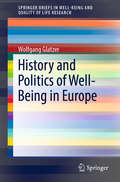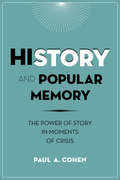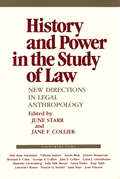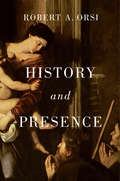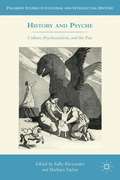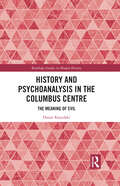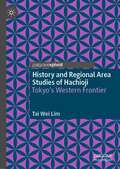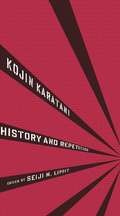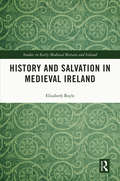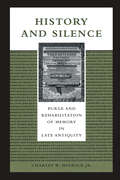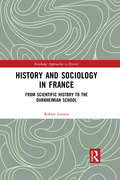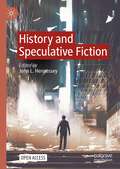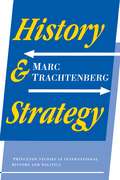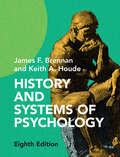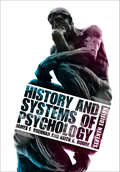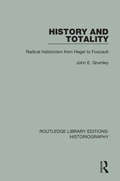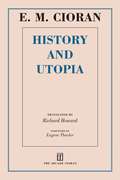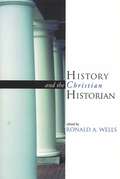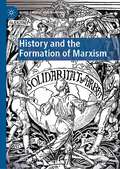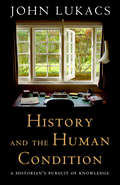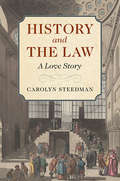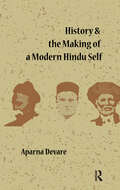- Table View
- List View
History and Politics of Well-Being in Europe (SpringerBriefs in Well-Being and Quality of Life Research)
by Wolfgang GlatzerThis book presents a reconstruction of the history of well-being on the European continent with special attention to the European Union, as people from Europe have a history of a long-term march towards well-being. It discusses ancient civilizations on the European continent, which have contributed significantly to the features of well-being in contemporary Europe. Following Europe`s success over the past millennium, which brought the continent a unique rise to better well-being it also imposed new challenges for sustaining well-being and alleviating misery. It is shown that Europeans attained a high level of well-being in global comparison, yet their attitudes remained at the same time ambivalent and precarious. Significant parts of the population claim a low well-being and suffer from the difficulties of life. Even though a top ranked area of socio-economic development in the world, this book shows that poverty, inequality and hardship remain stable structural problems which have to be overcome in order to avoid significant restrictions for a broad quality of life. But despite all their burdens and hardships, Europeans are among the most prosperous and privileged people in the world.
History and Popular Memory
by Paul A CohenWhen people experience a traumatic event, such as war or the threat of annihilation, they often turn to history for stories that promise a positive outcome to their suffering. During World War II, the French took comfort in the story of Joan of Arc and her heroic efforts to rid France of foreign occupation. To bring the Joan narrative more into line with current circumstances, popular retellings modified the original story so that what people believed took place in the past was often quite different from what actually occurred.Paul A. Cohen believes this interplay between story and history is a worldwide phenomenon found in countries of radically different cultural, religious, and social character. He focuses on Serbia, Israel, the Soviet Union, China, Great Britain, and France, all of which experienced severe crises in the twentieth century and, in response, appropriated age-old historical narratives that resonated with what was happening in the present to serve a unifying, restorative purpose.A central theme in the book is the distinction between popular memory and history. Although vitally important to historians, this distinction is routinely blurred in people's minds, and the historian's truth often cannot compete with the power of a compelling story from the past, even when it has been seriously distorted by myth or political manipulation. Cohen concludes by suggesting that the patterns of interaction he probes, given their near universality, may well be rooted in certain human propensities that transcend cultural difference.
History and Popular Memory: The Power of Story in Moments of Crisis
by Paul CohenWhen people experience a traumatic event, such as war or the threat of annihilation, they often turn to history for stories that promise a positive outcome to their suffering. During World War II, the French took comfort in the story of Joan of Arc and her heroic efforts to rid France of foreign occupation. To bring the Joan narrative more into line with current circumstances, however, popular retellings modified the original story so that what people believed took place in the past was often quite different from what actually occurred.Paul A. Cohen identifies this interplay between story and history as a worldwide phenomenon, found in countries of radically different cultural, religious, and social character. He focuses here on Serbia, Israel, China, France, the Soviet Union, and Great Britain, all of which experienced severe crises in the twentieth century and, in response, appropriated age-old historical narratives that resonated with what was happening in the present to serve a unifying, restorative purpose. A central theme in the book is the distinction between popular memory and history. Although vitally important to historians, this distinction is routinely blurred in people's minds, and the historian's truth often cannot compete with the power of a compelling story from the past, even when it has been seriously distorted by myth or political manipulation. Cohen concludes by suggesting that the patterns of interaction he probes, given their near universality, may well be rooted in certain human propensities that transcend cultural difference.
History and Power in the Study of Law: New Directions in Legal Anthropology (The Anthropology of Contemporary Issues)
by June Starr Jane F. CollierBuilding on earlier work in the anthropology of law and taking a critical stance toward it, June Starr and Jane F. Collier ask, "Should social anthropologists continue to isolate the ‘legal’ as a separate field of study?" To answer this question, they confront critics of legal anthropology who suggest that the subfield is dying and advocate a reintegration of legal anthropology into a renewed general anthropology. Chapters by anthropologists, sociologists, and law professors, using anthropological rather than legal methodologies, provide original analyses of particular legal developments. Some contributors adopt an interpretative approach, focusing on law as a system of meaning; others adopt a materialistic approach, analyzing the economic and political forces that historically shaped relations between social groups. Contributors include Said Armir Arjomand, Anton Blok, Bernard Cohn, George Collier, Carol Greenhouse, Sally Falk Moore, Laura Nader, June Nash, Lawrence Rosen, June Starr, and Joan Vincent.
History and Presence
by Robert A. OrsiThe unseeing of the gods was a requirement of Western modernity.<P><P> Beginning with sixteenth-century debates over Christ's real presence in the host, Robert Orsi imagines an alternative.<P> He urges us to withhold from absence the prestige modernity encourages and instead to approach contemporary religion and history with the gods fully present.<P>
History and Psyche
by Barbara Taylor Sally AlexanderToday, a widening range of historical phenomena are being examined through the psychoanalytic lens, while the psychoanalytic tradition itself is coming in for unprecedented historical scrutiny. This collection of essays showcases the innovative, and sometimes contentious, encounters between psychoanalysis and history.
History and Psychoanalysis in the Columbus Centre: The Meaning of Evil (Routledge Studies in Modern History)
by Danae KarydakiThis book draws on a range of key archives and oral testimonies to provide the first systematic and historical study of the origins, context, development, frustrations, inner contradictions, and legacies of the Columbus Centre. The Columbus Centre, a remarkable though largely forgotten research institute, was established at the University of Sussex in 1966, triggered by claims of a dearth of academic research about Nazism and the Holocaust. Its basic stated aim was to bring together psychoanalysis and history for a scholarly investigation of discrimination, mass violence, and the preconditions of genocide in the past and the present. The Nazi crimes were studied along with other instances of prejudice and mass violence, such as sixteenth- and seventeenth-century witch-hunts, South African apartheid, the persecution of the Roma people, and race relations in the United States and modern-day Britain. The book seeks to place the Columbus Centre in the historiography of mass violence by analysing the Centre’s works through four historiographical prisms or power relations in which they were produced: psychoanalysis, class, race, and gender. This interdisciplinary volume is a valuable text for scholars and students of historiography, psychoanalysis, genocide and violence, and postwar Europe, and for professionals within the field of psychology.
History and Regional Area Studies of Hachioji: Tokyo's Western Frontier
by Tai Wei LimThis book looks at the case study of Hachioji as a major transit hub with a world-class public transportation system in Japan. It tracks how Tokyo slowly expands into its suburban, rural or sub-rural districts. It also wants to profile the multiple identities of a city that is simultaneously an ecological asset, a heritage locale in addition to a logistics hub. The volume is probably the first of its kind to analyze the western sector of the largest city in the world.
History and Repetition
by Seiji M. Lippit Kojin KarataniKojin Karatani, one of Japan's most influential thinkers, wrote the essays collected in History and Repetition during a period of radical historical change, triggered by the collapse of the Cold War order and the death of the Sh'wa emperor in 1989. Through an original reading of Marx, Karatani developed a theory of history based on the repetitive cycle of crises attending the expansion and transformation of capital. His work led to a rigorous theoretical analysis of political, economic, and literary forms of representation-joined by a detailed, empirical study of Japan's modern history-that recast historical events as a series of repeated forms forged at moments of transition in the stages of global capitalism. History and Repetition helped cement Karatani's status as one of Japan's premier intellectuals, producing original work that traverses philosophy, political economy, history, and literature. The first complete translation into English, carried out with the cooperation of Karatani himself, this book begins with an innovative reading of Marx's The Eighteenth Brumaire of Louis Bonaparte, tracing the thinker's early formulation of a theory of the state. Following with a study of violent crises as they recur after major transitions of power, Karatani develops his theory of historical repetition, launching a groundbreaking interpretation of fascism (in both Europe and Japan) as the spectral return of the absolutist monarch amid the crisis of representative democracy. For Karatani, fascism represents the most violent materialization of the repetitive mechanism of history. At the same time, he also seeks out singularities operating outside historical repetition's brutal inevitability, whether they find representation in literature or, more precisely, in the process of literature's demise. Closely reading the work of Oe Kenzaburo, Mishima Yukio, Nakagami Kenji, and Murakami Haruki, Karatani compares what is recurrent and universal with what is singular and unrepeatable, while developing a compelling analysis of modern literature's decline (countering his influential account of modern literature's emergence in Origins of Modern Japanese Literature). Merging theoretical arguments with a concrete analysis of cultural and intellectual history, these essays provide a brilliant introduction to Karatani's thought and a multidisciplinary perspective on world history.
History and Repetition (Weatherhead Books on Asia)
by Kojin KarataniKojin Karatani wrote the essays in History and Repetition during a time of radical historical change, triggered by the collapse of the Cold War and the death of the Showa emperor in 1989. Reading Karl Marx in an original way, Karatani developed a theory of history based on the repetitive cycle of crises attending the expansion and transformation of capital. His work led to a rigorous analysis of political, economic, and literary forms of representation that recast historical events as a series of repeated forms forged in the transitional moments of global capitalism.History and Repetition cemented Karatani's reputation as one of Japan's premier thinkers, capable of traversing the fields of philosophy, political economy, history, and literature in his work. The first complete translation of History and Repetition into English, undertaken with the cooperation of Karatani himself, this volume opens with his innovative reading of The Eighteenth Brumaire of Louis Bonaparte, tracing Marx's early theoretical formulation of the state. Karatani follows with a study of violent crises as they recur after major transitions of power, developing his theory of historical repetition and introducing a groundbreaking interpretation of fascism (in both Europe and Japan) as the spectral return of the absolutist monarch in the midst of a crisis of representative democracy. For Karatani, fascism represents the most violent materialization of the repetitive mechanism of history. Yet he also seeks out singularities that operate outside the brutal inevitability of historical repetition, whether represented in literature or, more precisely, in the process of literature's demise. Closely reading the works of Oe Kenzaburo, Mishima Yukio, Nakagami Kenji, and Murakami Haruki, Karatani compares the recurrent and universal with the singular and unrepeatable, while advancing a compelling theory of the decline of modern literature. Merging theoretical arguments with a concrete analysis of cultural and intellectual history, Karatani's essays encapsulate a brilliant, multidisciplinary perspective on world history.
History and Salvation in Medieval Ireland (Studies in Early Medieval Britain and Ireland)
by Elizabeth BoyleHistory and Salvation in Medieval Ireland explores medieval Irish conceptions of salvation history, using Latin and vernacular sources from c. 700–c. 1200 CE which adapt biblical history for audiences both secular and ecclesiastical. This book examines medieval Irish sources on the cities of Jerusalem and Babylon; reworkings of narratives from the Hebrew Scriptures; literature influenced by the Psalms; and texts indebted to Late Antique historiography. It argues that the conceptual framework of salvation history, and the related theory of the divinely-ordained movement of political power through history, had a formative influence on early Irish culture, society and identity. Primarily through analysis of previously untranslated sources, this study teases out some of the intricate connections between the local and the universal, in order to situate medieval Irish historiography within the context of that of the wider world. Using an overarching biblical chronology, beginning with the lives of the Jewish Patriarchs and ending with the Christian apostolic missions, this study shows how one culture understood the histories of others, and has important implications for issues such as kingship, religion and literary production in medieval Ireland. This book will appeal to scholars and students of medieval Ireland, as well as those interested in religious and cultural history.
History and Silence: Purge and Rehabilitation of Memory in Late Antiquity
by Charles W. Hedrick&“It is so rare and refreshing to read a Roman history book which recognizes and celebrates the sheer difficulty of writing history&” (The Times Literary Supplement). The ruling elite in ancient Rome sought to eradicate even the memory of their deceased opponents through a process now known as damnatio memoriae. These formal and traditional practices included removing the person&’s name and image from public monuments and inscriptions, making it illegal to speak of him, and forbidding funeral observances and mourning. Paradoxically, however, while these practices dishonored the person's memory, they did not destroy it. Indeed, a later turn of events could restore the offender not only to public favor but also to re-inclusion in the public record. This book examines the process of purge and rehabilitation of memory in the person of Virius Nicomachus Flavianus. Charles Hedrick describes how Flavianus was condemned for participating in the rebellion against the Christian emperor Theodosius the Great—and then restored to the public record a generation later as members of the newly Christianized senatorial class sought to reconcile their pagan past and Christian present. By selectively remembering and forgetting the actions of Flavianus, Hedrick asserts, the Roman elite honored their ancestors while participating in profound social, cultural, and religious change. &“One of the most interesting and original books about the Later Roman Empire that I have ever read.&” —T. D. Barnes
History and Sociology in France: From Scientific History to the Durkheimian School (Routledge Approaches to History #23)
by Robert LerouxIn the late 19th century and early part of the 20th, with the coming of age of sociology in France, the idea that there could be a “science” of history was the subject of much and varied debate. The methodological problems surrounding historical knowledge that were debated throughout this period concerned not only scientific history, but the social sciences as well, and sociology more specifically. Although sociology was from its origins in competition with the discipline of history, from the outset, it too was interested in history as a form of objective knowledge. Many of sociology's founders believed that by retracing historical processes, they could make a clean break with abstraction and metaphysics. For their part, historians generally remained hostile to any kind of systematization. And yet, at the end of the 19th century, the science of history would draw some valuable lessons from the emerging methodology of sociology. It was in large part under the impetus of the issues and problems raised by the philosopher Henri Berr and by the Durkheimian School, with the economist François Simiand as its lead protagonist, that the community of historians, increasingly aware of the limits of narrative history, turned so enthusiastically to social and economic history – just as Durkheim and his disciples consulted history in order to avoid the twin pitfalls of the philosophy of history and of introspective psychology. History and Sociology in France focuses on this dialogue of the two neighboring sciences.
History and Speculative Fiction
by John L. HennesseyThis open access book demonstrates that despite different epistemological starting points, history and speculative fiction perform similar work in “making the strange familiar” and “making the familiar strange” by taking their readers on journeys through space and time. Excellent history, like excellent speculative fiction, should cause readers to reconsider crucial aspects of their society that they normally overlook or lead them to reflect on radically different forms of social organization. Drawing on Gunlög Fur’s postcolonial concept of concurrences, and with contributions that explore diverse examples of speculative fiction and historical encounters using a variety of disciplinary approaches, this volume provides new perspectives on colonialism, ecological destruction, the nature of humanity, and how to envision a better future.
History and Strategy (Studies in Intellectual History and the History of Philosophy #1)
by Marc TrachtenbergThis work is a powerful demonstration of how historical analysis can be brought to bear on the study of strategic issues, and, conversely, how strategic thinking can help drive historical research. Based largely on newly released American archives, History and Strategy focuses on the twenty years following World War II. By bridging the sizable gap between the intellectual world of historians and that of strategists and political scientists, the essays here present a fresh and unified view of how to explore international politics in the nuclear era. The book begins with an overview of strategic thought in America from 1952 through 1966 and ends with a discussion of "making sense" of the nuclear age. Trachtenberg reevaluates the immediate causes of World War I, studies the impact of the shifting nuclear balance on American strategy in the early 1950s, examines the relationship between the nuclearization of NATO and U.S.-West European relations, and looks at the Berlin and the Cuban crises. He shows throughout that there are startling discoveries to be made about events that seem to have been thoroughly investigated.
History and Systems of Psychology
by James F. Brennan Keith A. HoudeHistory and Systems of Psychology provides an engaging introduction to the rich story of psychology's past. Retaining its trademark clarity and accessibility, the Eighth Edition also features expanded coverage of non-western traditions in psychology as well as added coverage of nineteenth-century advances in philosophy and science. The emergence of applications of psychology in clinical, educational, neuroscientific, and social settings are further emphasized within the twenty-first-century landscape of psychology as a cognitive and a positive science. Assuming little prerequisite knowledge, the authors discuss the people, places, and concepts that have shaped psychology's story, and show that we remain fascinated and perplexed by the same enduring questions that confronted our ancestors – namely, our wonder at our subjectivity and consciousness of self. The Eighth Edition is supported by rich online resources including a manual, test bank, and lecture slides for instructors, and study guides and links to primary source literature for students.
History and Systems of Psychology: Pearson New International Edition
by James F. Brennan Keith A. HoudeComprehensive yet accessible, a classic survey of the history and systems of psychology -- from pre-Socratic philosophers to contemporary contributions from cognitive science and neuroscience is presented. Part I traces psychology's historical foundations from its beginnings to its emergence as a formal discipline in the 1870s. Part II deals with the major twentieth-century systems of psychology.
History and Totality: Radical Historicism From Hegel to Foucault (Routledge Library Editions: Historiography)
by John GrumleyIn this work, originally published in 1989, the author establishes a tradition of radical historicism from Hegel to the Budapenst School. He charts both its continuous evolution from the early 19th century to the late 20thh, and its transformation in the context of European social, economic and cultural change. Through a reappraisal of historical interpretation from Hegel to Foucault, the book demonstrates the contemporary relevance of radical historicism. It includes detailed analyses of Marx, Dilthey, Simmel, Weber, Lukácks, Horkheimer, Adorno and Habermas.
History and Utopia
by Richard Howard E. M. Cioran Eugene Thacker"Only a monster can allow himself the luxury of seeing things as they are," writes E. M. Cioran, the Romanian-born philosopher who has rightly been compared to Samuel Beckett.In History and Utopia, Cioran the monster writes of politics in its broadest sense, of history, and of the utopian dream. His views are, to say the least, provocative. In one essay he casts a scathing look at democracy, that "festival of mediocrity"; in another he turns his uncompromising gaze on Russia, its history, its evolution, and what he calls "the virtues of liberty." In the dark shadow of Stalin and Hitler, he writes of tyrants and tyranny with rare lucidity and convincing logic. In "Odyssey of Rancor," he examines the deep-rooted dream in all of us to "hate our neighbors," to take immediate and irremediable revenge. And, in the final essay, he analyzes the notion of the "golden age," the biblical Eden, the utopia of so many poets and thinkers.
History and Value: The Clarendon Lectures and the Northcliffe Lectures 1987
by Frank KermodeUniversity lectures on literature and art
History and the Christian Historian
by Ronald A. WellsThis volume arises out of special concerns of historians who are also Christians. What case can be made for connecting historical work and religious convictions? What is the relation of faith to history? What difference could Christian perspectives make in historical study? Thirteen respected scholars — including some who have changed the face of history writing in the twentieth century — here take up a diversity of subjects in giving a provisional answer to these important questions. In exploring foundational issues of perspective and theory, engaging discrete themes such as feminism, puritanism, and missiology, and discussing the application of religious insights in teaching history, this excellent collection of essays forthrightly addresses the &“epistemological crisis&” brought on by the postmodern critique of truth and demonstrates the positive implications of a Christian perspective for the study of history and historiography.
History and the Formation of Marxism (Marx, Engels, and Marxisms)
by Bertel NygaardThis book redefines the relationship between Marxism and history. At its roots, Marxism was aimed at analyzing society in order to change it, reflecting on the past to create the ‘poetry of the future.’ No single event of the past was as important to early Marxists as the French Revolution of 1789. Studying the varying uses of the history of that past event among Karl Marx, Friedrich Engels, and prominent European Marxists before 1914 (Karl Kautsky, V.I. Lenin, and others), this book argues that we should take the historiography of concrete past events seriously. It was not only an auxiliary element of Marxism, but a core constitutive element in its formation. Thus, this book calls for transcending traditional approaches to Marxism as a fixed set of social theories combined with strategies for the present and future. Important to students of Marxism, the labor movement, and the French Revolution alike, this study contains refreshing perspectives on the interplay between past, present, and future and on the role of states, social classes, socio-economic determination, and political organization in history.
History and the Human Condition: A Historian's Pursuit of Knowledge
by John LukacsIn a career spanning more than sixty-five years, John Lukacs has established himself as one of our most accomplished historians. Now, in the stimulating book History and the Human Condition, Lukacs offers his profound reflections on the very nature of history, the role of the historian, the limits of knowledge, and more.Guiding us on a quest for knowledge, Lukacs ranges far and wide over the past two centuries. The pursuit takes us from Alexis de Tocqueville to the atomic bomb, from American &“exceptionalism&” to Nazi expansionism, from the closing of the American frontier to the passing of the modern age.Lukacs&’s insights about the past have important implications for the present and future. In chronicling the twentieth-century decline of liberalism and rise of conservatism, for example, he forces us to rethink the terms of the liberal-versus-conservative debate. In particular, he shows that what passes for &“conservative&” in the twenty-first century often bears little connection to true conservatism.Lukacs concludes by shifting his gaze from the broad currents of history to the world immediately around him. His reflections on his home, his town, his career, and his experiences as an immigrant to the United States illuminate deeper truths about America, the unique challenges of modernity, the sense of displacement and atomization that increasingly characterizes twenty-first-century life, and much more. Moving and insightful, this closing section focuses on the human in history, masterfully displaying how right Lukacs is in his contention that history, at its best, is personal and participatory.History and the Human Condition is a fascinating work by one of the finest historians of our time. More than that, it is perhaps John Lukacs&’s final word on the great themes that have defined him as a historian and a writer.
History and the Law: A Love Story
by Carolyn SteedmanFocusing on everyday legal experiences, from that of magistrates, novelists and political philosophers, to maidservants, pauper men and women, down-at-heel attorneys and middling-sort wives in their coverture, History and the Law reveals how people thought about, used, manipulated and resisted the law between the eighteenth and the twentieth centuries. Supported by clear, engaging examples taken from the historical record, and from the writing of historians including Laurence Sterne, William Godwin, and E. P. Thompson, who each had troubled love affairs with the law, Carolyn Steedman puts the emphasis on English poor laws, copyright law, and laws regarding women. Evocatively written and highly original, History and the Law accounts for historians' strange ambivalent love affair with the law and with legal records that appear to promise access to so many lives in the past.
History and the Making of a Modern Hindu Self
by Aparna DevareTaking the contentious debates surrounding historical evidence and history writing between secularists and Hindu nationalists as a starting point, this book seeks to understand the origins of a growing historical consciousness in contemporary India, especially amongst Hindus. The broad question it poses is: Why has ‘history’ become such an important site of identity, conflict and self-definition amongst modern Hindus, especially when Hinduism is known to have been notoriously impervious to history? As modern ideas regarding notions of history came to India with colonialism, it turns to the colonial period as the ‘moment of encounter’ with such ideas. The book examines three distinct moments in the Hindu self through the lives and writings of lower-caste public figure Jotiba Phule, ‘moderate’ nationalist M. G. Ranade and Hindu nationalist V. D. Savarkar. Through a close reading of original writings, speeches and biographical material, it is demonstrated that these three individuals were engaged with a modern historical and rationalist approach. However, the same material is also used to argue that Phule and Ranade viewed religion as living, contemporaneous and capable of informing both their personal and political lives. Savarkar, the ‘explicitly Hindu’ leader, on the contrary, held Hindu practices and traditions in contempt, confining them to historical analysis while denying any role for religion as spirituality or morality in contemporary political life. While providing some historical context, this volume highlights the philosophical/ political ideas and actions of the three individuals discussed. It integrates aspects of their lives as central to understanding their politics.
